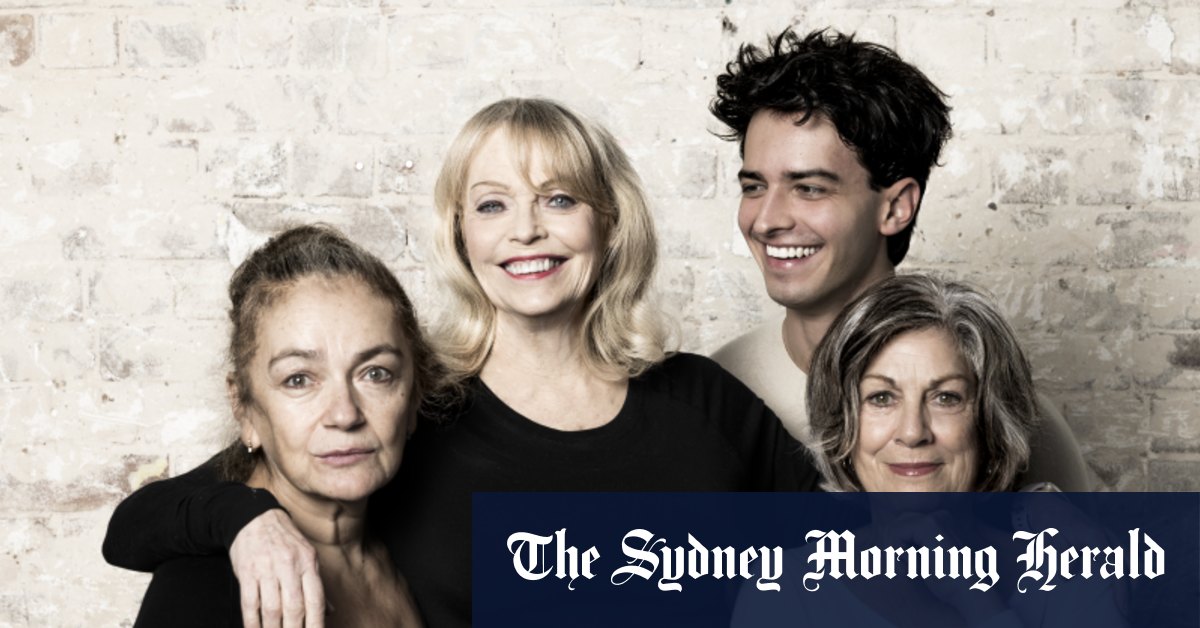Smith and director Sarah Goodes wanted to capture the mystery and transcendence essential to Wood’s 2019 novel and both believe theatre is the best medium to do that rather than the screen.
“The screen inevitably imposes naturalism on material,” says Smith, who is also a screenwriter. “But The Weekend goes beyond naturalism. It strives towards the ineffable and the mysterious. Theatre can cross dimensions much more fluidly than the screen can.”
Author Charlotte Wood (right, with playwright Sue Smith) visited rehearsals for The Weekend.Credit: Brett Boardman
This is the first time one of Wood’s novels has been adapted for stage. The author sat in on a few rehearsals and has found the process thrilling to observe.
“My approach was absolutely to let go,” says Wood. “I love the way that one art form can light the flame for another. It doesn’t diminish the original … there’s a whole lot of compression that absolutely has to take place, but that doesn’t mean a reduction. It’s creating a new thing.”
Over the years, Sydney has seen some memorable theatre adaptations of much-loved and well-known Australian novels, among them Tim Winton’s Cloudstreet, Ruth Park’s The Harp in the South and Craig Silvey’s Jasper Jones.
Loading
The appeal for theatre companies is partly pragmatic. An adaptation will inevitably draw audiences who love the novel. And when companies are financially stretched this is less risky than staging a new, unknown work.
But why do audiences flock to see adaptations? Playwright Verity Laughton, who is adapting The Dictionary of Lost Words for State Theatre Company South Australia and Sydney Theatre Company (STC), suggests that this may be driven by the reality that few of us revisit books any more.
“People used to re-read favourite books and lose themselves in that world again,” she says. “Now, there’s so much to read, and much of it is so glorious with the mental universes that you can step into. But it means those that particularly speak to us, we don’t spend the time with again.”
Instead of revisiting a favourite novel, we might seek it out in a new form. An audience’s demands from a stage adaptation of a popular novel differs from an adaptation of a classic or ancient Greek text. With the latter, the appeal is the adaptor or director’s interpretation.
“What you connect with when you read a book is you love being in that world. The task for a playwright is to recreate the feeling of being in that world and with those characters,” says Laughton.

Verity Laughton has adapted Dictionary of Lost Words for STCSA and STC.Credit: Matt Byrne
The Dictionary of Lost Words is a sweeping period epic that unfolds over several decades, from when a four-year-old girl, Esme, begins collecting words discarded by men compiling the first Oxford English Dictionary.
Laughton needed to compress this time span into a two-hour play, while ensuring audiences know enough about the child to understand her world and the impact of events such as the suffrage movement and World War I.
“You need to know that determined, charming, obsessive, sweet, odd little girl. You need to know her to have a feeling for what she is coping with in terms of her own psychology and the great big wider world,” says Laughton.
Loading
She sees her role as facilitating the movement of the existing story to the stage. It is not her own story.
“I have a responsibility to that audience to bring, not a carbon copy of the book, but something that essentially has the tone of the book,” says Laughton.
Where to start with adapting a novel? Tommy Murphy begins with that most prosaic of forms: a spreadsheet. His detailed breakdown of the story, scenes and characters helps him make decisions about what will work on stage and what characters can be cut or combined.
“There’s always a column for big, bold ideas – the inspiring column, which is the possibilities of it.”
Known for his adaptation of the memoir Holding the Man, Murphy recently adapted Nevil Shute’s 1957 novel of atomic annihilation On the Beach for STC. What did the spreadsheet for that include? “Dream, memory, access to a future,” he says.

Tommy Murphy (left) and director Kip Williams during rehearsal for On the Beach at Sydney Theatre Company.Credit: Daniel Boud
What works on the page does not necessarily work on stage. Murphy’s pet stage hate is reliance on direct address – a character speaking straight to the audience or narrating the action – which can form the heart of a novel.
“I hate it when …fidelity [to the book] is too strong,” says Murphy. “We have to reinvent.”
Adaptation is a delicate balance between serving the original story – but not at the expense of theatricality.
“We’re not there for literary devices,” says Murphy. “We’re there for the fun of theatre, the magic of theatre, the imagination of theatre.”
The Weekend is at Belvoir St Theatre from August 9 to September 10. The Dictionary of Lost Words is at Opera House Drama Theatre from October 28 to December 16. On the Beach is at Roslyn Packer Theatre until August 12.
Find out the next TV, streaming series and movies to add to your must-sees. Get The Watchlist delivered every Thursday.
